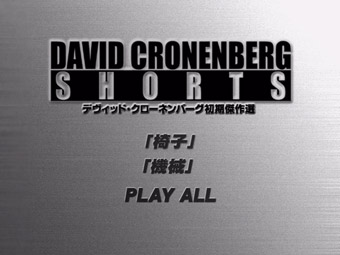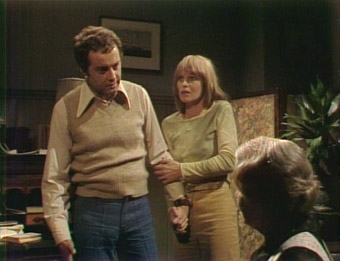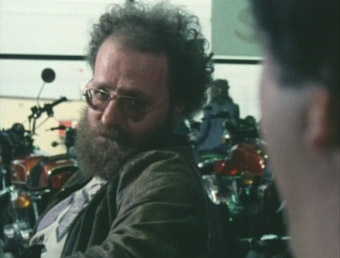|
Short
films are both a challenge and an opportunity for a director – a challenge because the cut-down running time makes character
death and plot complexity harder to pull off than in a feature-length work (though looking
at the character development in some recent American blockbusters
you wouldn't know it), an opportunity because no-one expects
there to be detailed character development in short films
in the first place. This makes it perfectly acceptable to use
the sort of short-cuts that look out of place in a feature
film and to make a work based solely around a single idea
rather than a fully developed story.
Short
films are also seen as calling cards for wannabe feature
directors, and for film fans, unearthing early short works
by now famous filmmakers can be a fascinating and sometimes
enlightening experience, allowing us to trace a director's development, to
see where it all started and how much their style has developed,
or perhaps even diluted. Early shorts by directors
such as Hal Hartley and David Lynch clearly point the way
to their later work and remain intriguing (and in the
case of Lynch's The Alphabet and The
Grandmother, disturbing) films in their own right.

For
horror fans, David Cronenberg is a genre god, an auteur
whose distinctive vision has repeatedly resulted in films
that few others would have ever attempted, let alone delivered
in such mesmerising fashion. Those who have more recently discovered Cronenberg's
have had to look backwards to find
the early gems, but I was lucky enough to be there at the beginning, one of
the few extolling the virtues of Shivers
(1975) when so many others were dishing out a critical pasting,
trotting off to the cinema to see to Rabid
(1977) as a birthday treat and enthusiastically defending
The Brood
(1979) as a minor masterpiece in my college campus magazine, despite
the disgusted protestations of one of my film lecturers.
With that in mind, the discovery of a Japanese DVD containing two early short
films by one of my favourite directors was a special moment
for me. It was a chance thing – I was visiting a friend
in Tokyo and one of his students took me on a trip round
the more specialist shops in Shinjuku, the city's
liveliest district, where I was introduced to an independent
record store and a small room just crammed with DVDs. Searching
shelf after shelf of disks with nothing but Japanese lettering on
the spines is something of a challenge for anyone not fluent
in the written language, and you tend to
skip a lot, but for some reason Happinet Pictures (who also
released the excellent 2-disk set of Tsukamoto's A
Snake of June) had decided to put the title
of this one in English. I was excited as hell – two early Cronenberg
shorts, one of which had, as far as I am aware, never been
screened in the UK. I'd seen Stereo
(1969) and Crimes
of the Future (1970) and though both are a tad heavy
going in places, they remain fascinating and in many ways
recognisably Cronenberg works. Just what had I discovered here?
I
was back home and browsing through all the information I
had on Cronenberg before I realised what I'd actually purchased.
Two short films, sure, but both were made for TV as part
of two different Canadian television series. Had I stumbled across two rare
Cronenberg films or two examples of David Cronenberg, young
director for hire, simply earning his keep until he could
get the next feature off the ground? As it turns out, a
bit of both...
The
Lie Chair
is an episode of the Canadian Broadcasting Company
series Peep Show, which ran from 1975 to 1976.
This is clearly a Canadian Tales of the Unexpected,
each week featuring a new story of mystery and intrigue with
a twist in the tail. The comparison extends beyond the structural
style – the studio based, shot-on-video look also mirrors
that of its UK counterpart. Interesting then, that Peep Show predates Tales of the Unexpected, which first began airing in 1979, by four years.

After
their car breaks down on a stormy night, young couple Neil
and Carol Croft arrive at the door of elderly Mrs. Rogers
and her maid Mildred. They are initially mistaken by Mrs.
Rogers for her grandchildren, Robert and Sylvia, who were
expected for dinner; when they protest their true identities,
each of the women suggests that they are merely putting
on an act to comfort the other and ask for the couple's
co-operation in this. As the evening progresses, Neil and Carol
realise something is very wrong above and beyond the behaviour
of their hosts.
Anyone
familiar with the Roald Dahl-inspired series will find themselves
at home here, but will also have little trouble working
out what the big mystery is. That said, it does unfold with
reasonable efficiency and the performances of the four
leads are solid enough, despite the very hollow studio atmosphere.
The show no doubt had its own look and feel, and Cronenberg
here is clearly marking time until his next, more personal
project. If you did not know of his involvement, there is
nothing about the handling that would prompt you to wonder, "Hey,
I wonder who directed this?" but few studio-based,
multi-camera TV dramas of the time allowed for much in the way of artistic
expression. Here the directive appears to be that the filmmaker do nothing
to get in the way of the story and Cronenberg obliges.
The result is an efficient but ultimately run-of-the-mill
TV mystery play. The show runs for 27 minutes and includes
a sizeable extract from next week's story at the end, which
stars a young, very fresh-faced Martin Short.
The
Italian Machine
is part of the CBC series Teleplay, runs for 24
minutes, and is a very different story. Shot on location on 16mm
film, this was written and directed by Cronenberg and is
clearly a more personal work than The Lie Chair – I know little about the Teleplay series itself,
but a far greater degree of artistic freedom is clearly
allowed within its format. The resulting work would qualify,
I believe, as a Cronenberg film, and will be of interest
to the director's fans for a number of reasons.
Lionel,
Fred and Bug are three motorcycle obsessives who
hang around a workshop and listen to recordings of the Isle
of Man TT races for relaxation. One day, Bug storms in with
astonishing news – a glorious Ducati 900 Desmo Super-Sport,
one of only forty ever constructed, has been bought not
by a biker, but by an art collector who has no intention
of riding it and instead plans to stand it in his living
room as an exhibit. Insane with rage at this sacrilege,
Lionel is determined to rescue The Italian Machine from
this appalling fate.

1979's
Fast Company is generally regarded as something
of an atypical Cronenberg film because its principal concern
is not body horror but fast cars. Cronenberg himself has
on occasion expressed frustration that people seem to forget
about this work when wondering why he never makes a non-horror
film, especially given his own passion for motorised speed. Interviewed by Phil Edwards in issue 36 of Starburst
shortly after the UK release of Scanners,
Cronenberg was asked about this part of his life and responded,
"I love motorbikes and cars and rock music. I don't
get to work that into the other films I do." Fast
Company, then, was as personal a work for the director
as any of his genre films, and part of The Italian
Machine's interest lies in its retrospective status
as a forerunner and companion piece to that movie and this otherwise rarely explored aspect of Cronenberg's personality.
It's certainly a story told very much from a biker's perspective – the anger that some middle-class art collector could
take a great motorbike and turn it into an object d'art
comes very much from the heart. This sense of outrage finds its on-screen
expression in Lionel, who explodes into fury at the very idea,
stamping a table to pieces and having to be wrestled into
a chair by his companions and calmed by the soothing sound
of TT racing commentary.
It's this character detail that make The Italian Machine
an altogether more interesting work than the more by-the-numbers
The Lie Chair. Being shot on film and on location, it also boasts a more distinctive
use of camera placement and movement. That's not to say anyone
is going to champion it as great cinema – a couple of the
performances (notably Hardee Linehan as Bug) are seriously
lacking, and though the journey there is enjoyable enough,
the ending is completely surprise-free and again seems to
have been written with purely a biker audience in mind.
But a sound central concept, assured assured technical handling,
some OK work from the supporting cast, an enjoyable turn
from Gary McKeehan as Lionel, a handful of very neat character
moments and a nice underlying oddness make The Italian
Machine a very worthwhile find. This is doubly
true for Cronenberg fans, who will find a fair few connections
with some of his later work: Fast Company links
aside, several of the cast went on to appear in subsequent
Cronenberg features – Frank Moore (who plays Fred) and Louis
Negin (Mouette) were both in Rabid, Hardee
Lineham (Bug) was in The Dead Zone (1983),
Géza Kovács (Ricardo) was in Scanners
(1981) and The Dead Zone, Cedric Smith
(Luke) was in Fast Company, and Gary McKeehan,
who plays Lionel, appeared in Rabid and
had a memorable turn in The Brood as psychoplasmics
patient Mike.
Whether
this constitutes enough for the director's fans to hunt
the disc out on Asian DVD sites and cough up the required dosh is another matter.
For Cronenberg completists it's a bit of a must, but others might
like to hang around and see if the films turn up on extras
on (hopefully) later Cronenberg special editions (Stereo
and Crimes of the Future first appeared on DVD as bonus features on the Blue Underground's 2-disk
release of Fast Company). Though the combined
running time is just over 50 minutes, for The Italian
Machine alone, I'm happy enough with my purchase.
Apart
from the film-based opening titles, The Lie Chair
was shot on 4:3 NTSC video circa 1975. Colours are very
muted, leaning towards a green-brown palette (which may
have been intended, of course), but the picture is glitch-free,
reasonably sharp and with a decent contrast. Black
levels are on the whole quite good, but can get a severely
washed out in darker scenes. Some video noise is evident
in places, but not distractingly so.
The
Italian Machine was shot on 16mm for TV broadcast,
is framed 4:3 and though very watchable, has not undergone
any major restoration for this transfer – grain is visible,
resulting in some minor artefacting, and there are a fair
number of dust spots. On top of that the picture itself
is a touch soft and washed out in places, with little in
the way of solid blacks in darker scenes. It looks what
it is – a low budget 16mm print, but the transfer could
still have been a lot better.
Both
films have a Dolby 2.0 mono track. The studio-recorded track
on The Lie Chair is very clear, but leans
towards the treble, resulting in some slight hissing on
words that have the letter S in them and some very minor
distortion in the louder sounds. Sound on The Italian
Machine is mono, unfussy and generally clear.
Not
a thing.
This
is essentially a specialist DVD with a limited market: two
short early films by a director whose very distinctive style
is only partially evident here. The Lie Chair
is interesting, but no more so than any other TV tale of
mystery, but The Italian Machine has more
going for it and is the one I have found myself going back
to, for its character detail, its biker perspective, Gary
McKeehan's twitchy central turn and Cronenberg's
confident technical handling. The lack of extras is a huge
shame considering the short overall running time, and makes
the disk questionable value, but it's still something of
a must-have for Cronenberg completists, and at present is
the only way to track down either work on DVD.
|